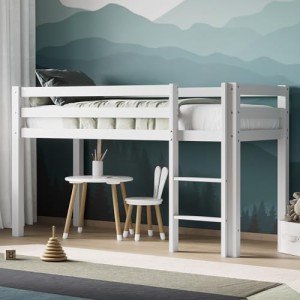Why Bunk Beds Sale Is A Must At The Very Least Once In Your Lifetime
Bunk Beds Sale: A Comprehensive Guide to Choosing the Right Bunk Bed for Your Home
Bunk beds have long been a staple in children's bed rooms, offering a combination of space-saving efficiency and fun. Whether accommodating brother or sisters, buddies on pajama parties, or just making the most of a playroom, bunk beds have actually ended up being an essential component in modern family homes. As sales on bunk beds increase, it ends up being increasingly essential for customers to make informed decisions when acquiring one. This short article will cover the fundamentals of purchasing a bunk bed, from types to safety features, in addition to tips for preserving the stability of your financial investment.
Types of Bunk Beds
When considering a bunk bed sale, it's crucial to comprehend the various styles offered on the marketplace. Below are the most common types:
Traditional Bunk Beds: These include 2 beds stacked one above the other, sharing a single frame. They are often the most economical alternative.
L-Shaped Bunk Beds: This style includes one bed placed vertically and another horizontally. This plan creates additional space below the upper bed, which can be utilized for storage or a play location.
Lofted Beds: Similar to conventional bunk beds however with no lower bed. Rather, the space below can be used for a desk, play location, or extra storage.
Triple Bunk Beds: For households with a larger number of kids or regular sleepovers, triple bunk beds provide three sleeping locations in a space-efficient design.
Futon Bunk Beds: These styles combine bunk beds and futon couches. The bottom area transforms into a separate seating location, improving performance.
Convertible Bunk Beds: These beds can be separated into 2 individual beds, making them flexible as children's requirements alter in time.
Table 1: Comparison of Bunk Bed Types
Type
Description
Space Efficiency
Extra Features
Standard Bunk Bed
2 beds stacked vertically
High
Easiest style
L-Shaped Bunk Bed
One vertical and one horizontal bed
Moderate
Play or storage space
Lofted Bed
Elevated bed with open space listed below
High
Work/play location
Triple Bunk Bed
Three stacked beds
Really High
Accommodates more users
Futon Bunk Bed
Bunk bed with a convertible futon
High
Multi-functional
Convertible Bunk Bed
Can be split into 2 separate beds
Moderate
Versatility & & durability
Safety Features to Consider
Security is paramount when investing in a bunk bed. Below are essential safety features to try to find:
Guardrails: Adequate guardrails must be present on both sides of the upper bunk to avoid falls. They should be at least 5 inches greater than the mattress.
Ladder Design: Look for durable, wide ladders with slip-resistant rungs. Ensure that the angle is not too steep for simple gain access to.
Stability: Ensure the bed is constructed with strong products, such as strong wood or durable metal. The bed should not wobble when in usage.
Weight Limit: Check the weight capacity of the bunk bed to guarantee it can accommodate the intended users securely.
Material Safety: If possible, select beds made from non-toxic products or those satisfying safety standards for kids's furnishings.
Table 2: Essential Safety Features
Feature
Description
Significance
Guardrails
Sides of upper bed to prevent falls
Necessary for child safety
Ladder Design
Strong, slip-resistant rungs
Help safe and simple gain access to
Stability
Construct quality to prevent wobbling
Guarantees security and longevity
Weight Limit
Maximum weight capability
Prevents mishaps
Material Safety
Non-toxic, safe products
Safeguards children's health
Upkeep Tips for Bunk Beds
To extend the life of your bunk bed and guarantee continuous security, consider the following maintenance suggestions:
Regular Inspections: Periodically check the structure for loose screws, bolts, or any signs of wear. Tighten fasteners as needed.
Tidy Periodically: Dust and clean the surface areas regularly. Usage Bunk Beds Cheap that won't damage the surface.
Examine Weight Limits: Be conscious of weight limits, especially with older kids or adults who may wish to use the upper bunk.
Avoid Climbing on Guardrails: Educate children not to use guardrails for climbing or playing to decrease the danger of accidents.
Often Asked Questions (FAQs)
Q1: What is the age limit for kids to safely use bunk beds?A: While it varies by the manufacturer, lots of advise that kids under 6 ought to not oversleep the upper bunk due to safety issues.
Q2: How can moms and dads discourage unsafe climbing?A: Setting clear rules about bunk bed usage and supervising kids can assist. Additionally, utilizing a bed camping tent can dissuade climbing up while creating an enjoyable sleep environment.
Q3: What should I consider when decorating a space with bunk beds?A: Ensure there suffices space around the bunk bed for safe movement, and use the decor to create personalized spaces for each kid.
Q4: Is a lofted bed appropriate for older kids?A: Yes, lofted beds can be appropriate for older kids as long as they satisfy security requirements and the child is responsible enough to utilize them safely.
Bunk beds serve a practical purpose while adding a component of fun to a kid's bed room. As sales of bunk beds continue to rise, cautious factor to consider of types, safety functions, and maintenance practices is important for moms and dads and caretakers. By comprehending these important elements, households can discover the ideal bunk bed for their home, guaranteeing both practicality and safety for several years to come. Whether it's for brother or sisters sharing a space or producing a cozy pajama party space, a well-chosen bunk bed can provide pleasure and functionality, making it a worthwhile financial investment.
